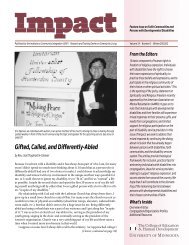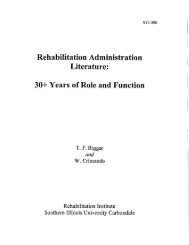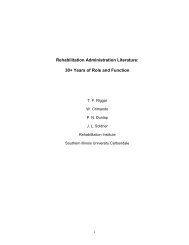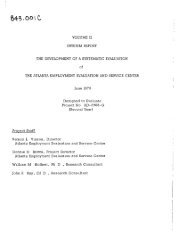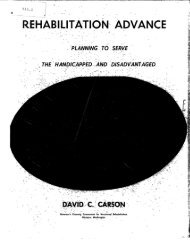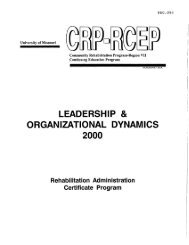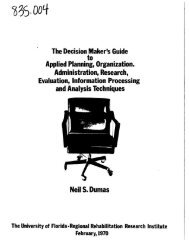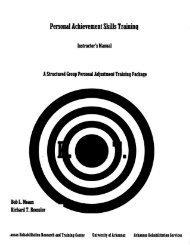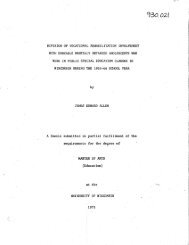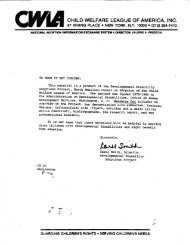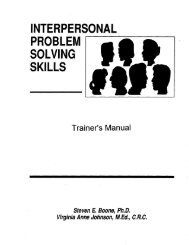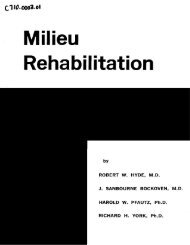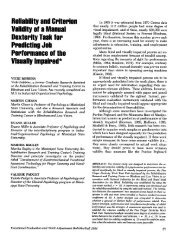Meeting Global Deaf Peers, Visiting Ideal Deaf Places ... - NCRTM
Meeting Global Deaf Peers, Visiting Ideal Deaf Places ... - NCRTM
Meeting Global Deaf Peers, Visiting Ideal Deaf Places ... - NCRTM
Create successful ePaper yourself
Turn your PDF publications into a flip-book with our unique Google optimized e-Paper software.
DEAF WAYS OF EDUCATION LEADING TO EMPOWERMENT<br />
References<br />
Braidotti, R. (1998). Difference, diversity, and<br />
nomadic subjectivity. Retrieved November<br />
23, 2005, from http://www.let.uu.nl/~Rosi.<br />
Braidotti/personal/rosilecture.html<br />
Breivik, J. (2005). <strong>Deaf</strong> identities in the making:<br />
Local lives, transnational connections.<br />
Washington, DC: Gallaudet University Press.<br />
Breivik, J., Haualand, H., & Solvang, P. (2002).<br />
Rome—A temporary deaf city! <strong>Deaf</strong>lympics<br />
2001 (Working Paper No. 2–2003). Bergen,<br />
Norway: Stein Rokken Center for <strong>Deaf</strong> Studies,<br />
University of Bergen. Retrieved October<br />
12, 2005, from http://www.ub.uib.no/elpub/<br />
rookkan/N/N02–02.pdf<br />
Broekaert, E., Bogaerts, J., & Clement, J. P.<br />
(1994). Wat doven zeggen: Onderzoek<br />
naar de socio-educatieve leefsituatie van<br />
volwassen doven en slechthorenden uit het<br />
buitengewoon onderwijs in Vlaanderen.<br />
[What deaf people say: Research on the social-educational<br />
life situation of adult deaf<br />
and hard of hearing people with special education<br />
backgrounds in Flanders]. Leuven,<br />
Belgium: Garant.<br />
Buyens, M. (1990). Commentaar [Editor’s comment].<br />
Onze Vriend, 66(7), 1.<br />
Buyens, M. (2005). De dove persoon, zijn<br />
gebarentaal en het dovenonderwijs. [The<br />
deaf person, his sign language, and deaf education].<br />
Antwerpen, Belgium: Garant.<br />
Chamberlin, J. (1997). A working definition of<br />
empowerment. Psychiatric Rehabilitation<br />
Journal, 20(4), 43–46.<br />
Charlton, J. I. (1998). Nothing about us without<br />
us: Disability, oppression, and empowerment.<br />
Berkeley: University of California Press.<br />
Christiansen, J. B., & Barnartt, S. N. (1995).<br />
<strong>Deaf</strong> president now! The 1988 revolution at<br />
Gallaudet University. Washington, DC: Gallaudet<br />
University Press.<br />
De Clerck, G. (2005). WAKE UP WAKE UP. Stories<br />
of growth, strength, and fire. MEET<br />
MEET, VISIT VISIT: Nomadic deaf identities,<br />
deaf dream worlds, and the imagination<br />
leading to translocal deaf activism.<br />
Ghent, Belgium: Ghent University.<br />
Denzin, N., & Lincoln, Y. (1994). Handbook of<br />
qualitative research. Thousand Oaks, CA:<br />
Sage.<br />
De Weerdt, K., Vanhecke, E., Van Herreweghe,<br />
M., & Vermeerbergen, M. (2002). De<br />
dovengemeenschap in Vlaanderen: Doorlichting,<br />
sensibilisering, en standaardisering<br />
van de Vlaamse Gebarentaal. Luik 2:<br />
Lexicografisch onderzoek. Eindrapport<br />
[The deaf community in Flanders: Investigation,<br />
sensitization, and standardization<br />
of Flemish Sign Language. Part 2: Lexicographic<br />
research. Final report]. Ghent, Belgium:<br />
Ghent University.<br />
D’Hoore, R., Vandevelde, P., & Verstraete, F.<br />
(Eds.). (1998). Eindrapport over het onderzoek<br />
naar de status van de gebarentaal in<br />
Vlaanderen [Final report about the research<br />
18<br />
on the status of sign language in Flanders].<br />
Destelbergen, Belgium: Cultuur voor Doven<br />
vzw.<br />
Ellis, C., & Bochner, A. P. (1996). Composing<br />
ethnography. Alternative forms of creative<br />
writing. Walnut Creek, CA: Altamira Press.<br />
Erting, C. (1996). Introduction. In C. Erting, R. C.<br />
Johnson, D. L. Smith, & B. D. Snider (Eds.),<br />
The <strong>Deaf</strong> way: Perspectives from the international<br />
conference on <strong>Deaf</strong> culture (pp.<br />
xxiii–xxxi). Washington, DC: Gallaudet University<br />
Press.<br />
Fosshaug, S. (2004). <strong>Deaf</strong> sports: An empowerment<br />
perspective. WFD News, 17(2), 5–6.<br />
Freire, P. (2005). Pedagogy of the oppressed.<br />
New York: Continuum.<br />
Gerday, C., & Thomas, V. (2001). L’histoire des<br />
sourds [History of the deaf]. Lieèagge, Belgium:<br />
Centre Robert Dresse.<br />
Goodley, D., Lawthom, R., Clough, P., & Moore,<br />
M. (2004). Researching life stories: Method,<br />
theory, and analyses in a biographical age.<br />
London: Routledge Falmer.<br />
Harris, A., & Enfield, S. (2003). Disability, equality,<br />
and human rights: A training manual<br />
for development and humanitarian organisations.<br />
Oxford, England: Oxfam Publishing.<br />
Heyerick, I. (2006). Flemish Sign Language<br />
(VGT) unanimously recognized. Retrieved<br />
October 31, 2006, from the Fevlado Web site:<br />
http://www.fevlado.be/themas/gebarentaal/<br />
overzicht.aspx<br />
Jankowski, K. A. (1997). <strong>Deaf</strong> empowerment:<br />
Emergence, struggle, and rhetoric. Washington,<br />
DC: Gallaudet University Press.<br />
Ladd, P. (2003). Understanding <strong>Deaf</strong> culture:<br />
In search of <strong>Deaf</strong>hood. Clevedon, England:<br />
Multilingual Matters.<br />
Lane, H. (1993). The mask of benevolence. New<br />
York: Vintage Books.<br />
Leedy, P. D., & Ormrod, J. E. (2003). Practical<br />
research: Planning and design. Englewood<br />
Cliffs, NJ: Prentice Hall.<br />
Le Maire, B. (1996). Joseph Henrion: Premier<br />
professeur sourd de Belgique [Joseph Henrion.<br />
First deaf teacher in Belgium]. Liège,<br />
Belgium: Centre Robert Dresse.<br />
Le Maire, B. (1997). Histoire des sourds en Belgique,<br />
en France, et dans les autres pays:<br />
Deuxième partie [History of the deaf in Belgium,<br />
France, and other countries: Part 2].<br />
Liège, Belgium: Centre Robert Dresse.<br />
List, G. (2003). Life histories of the deaf in an<br />
oralist world: Preliminary reflections on a pilot<br />
project. In R. Fischer & H. Lane (Eds.),<br />
Looking back: A reader on the history of<br />
deaf communities and their sign languages<br />
(pp. 503–514). Hamburg, Germany: Signum.<br />
Loots, G., Devise, I., Lichtert, G., Hoebrechts,<br />
N., Van De Ginste, C., & De Bruyne, I.<br />
(2003). De Gemeenschap van doven en<br />
slechthorenden in Vlaanderen: Communicatie,<br />
taal en verwachtingen omtrent<br />
maatschappelijke toegankelijkheid [The<br />
community of deaf and hard of hearing<br />
people in Flanders: Communication, language,<br />
and expectations of access to society].<br />
Ghent, Belgium: Cultuur voor Doven<br />
vzw.<br />
Monaghan, L., Schmaling, C., Nakamura, K., &<br />
Turner, G. H. (Eds.). (2003). Many ways to<br />
be deaf: International variation in <strong>Deaf</strong><br />
communities. Washington, DC: Gallaudet<br />
University Press.<br />
Moos, R. H. (1990). Coping responses inventory<br />
manual. Palo Alto, CA: Stanford University,<br />
Department of Psychiatry and Behavioral<br />
Sciences.<br />
Mottez, B. (1993). The deaf mute banquets and<br />
the birth of the deaf movement. In R. Fischer<br />
& H. Lane (Eds.), Looking back: A reader on<br />
the history of deaf communities and their<br />
sign languages (pp. 143–155). Hamburg,<br />
Germany: Signum.<br />
Murray, J. (in press). Coequality and transnational<br />
studies: Understanding deaf lives. In<br />
D. Bauman (Ed.), Sightings: Explorations in<br />
deaf studies. Minneapolis: University of Minnesota<br />
Press.<br />
Padden, C., & Humphries, T. (1988). <strong>Deaf</strong> in<br />
America: Voices from a culture. Boston:<br />
Harvard University Press.<br />
Pease, B. (2002). Rethinking empowerment: A<br />
postmodern reappraisal for emancipation<br />
practice. Sociale Interventie, 11(3), 29–37.<br />
Reilly, C. B. (1995). A deaf way of education:<br />
Interaction among children in a Thai<br />
boarding school. Unpublished doctoral dissertation,<br />
University of Maryland, College<br />
Park.<br />
Roets, G., Ramboer, I., Verstraeten, M., Demaagd,<br />
M., Van Hove, G., & Vanderplasschen,<br />
W. (2005). Op zoek naar werk met<br />
mensen met psychische problemen [Looking<br />
for employment with people who have<br />
psychological problems]. Ghent, Belgium:<br />
Academia Press.<br />
Roets, G., Reinaart, R., & Van Hove, G. (in<br />
press). Intersecting the disciplinary characters<br />
of gender studies and disability studies:<br />
Discovering a sense of nomadic subjectivity<br />
throughout Rosa’s life story. Journal of Gender<br />
Studies.<br />
Scheiris, I., & Raemdonck, L. (in press). Ongehoord<br />
verleden: Doofbewustzijn in historisch<br />
perspectief. [Unheard past: <strong>Deaf</strong><br />
awareness from a historical perspective].<br />
Ghent, Belgium: Fevlado-Diversus vzw.<br />
Soto, A. M. (2003). The awakening. In G. Taylor<br />
& A. Darby (Eds.), <strong>Deaf</strong> identities (pp.<br />
258–267). Coleford, England: Douglas<br />
McLean.<br />
Spradley, J. P. (1997). The ethnographic interview.<br />
New York: Wadsworth.<br />
Stebbins, R. A. (2001). Exploratory research in<br />
the social sciences. Thousand Oaks, CA:<br />
Sage.<br />
Strauss, A., & Corbin, J. (1990). Basics of qualitative<br />
research: Grounded theory procedures<br />
and techniques. Thousand Oaks, CA: Sage.<br />
VOLUME 152, NO. 1, 2007 AMERICAN ANNALS OF THE DEAF



